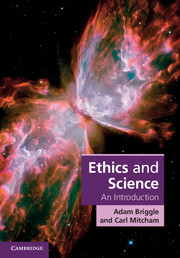Book contents
- Frontmatter
- Contents
- List of figures and tables
- Preface
- 1 Introduction and overview
- 2 Ethical concepts and theories
- 3 Science and its norms
- 4 Research ethics I
- 5 Research ethics II
- 6 Research ethics III
- 7 The science of ethics
- 8 Transition
- 9 Science and politics I
- 10 Science and politics II
- 11 Science and ideational culture
- 12 Science applied
- Epilogue Looking back, leaning forward
- Appendix Ethics codes
- Bibliography
- Index
- References
2 - Ethical concepts and theories
Published online by Cambridge University Press: 05 November 2012
- Frontmatter
- Contents
- List of figures and tables
- Preface
- 1 Introduction and overview
- 2 Ethical concepts and theories
- 3 Science and its norms
- 4 Research ethics I
- 5 Research ethics II
- 6 Research ethics III
- 7 The science of ethics
- 8 Transition
- 9 Science and politics I
- 10 Science and politics II
- 11 Science and ideational culture
- 12 Science applied
- Epilogue Looking back, leaning forward
- Appendix Ethics codes
- Bibliography
- Index
- References
Summary
Following the Chapter 1 high-altitude overview of the whole terrain to be covered, Chapter 2 begins with an inventory of key concepts and theories. This is not a book focused primarily on theory. But concepts indicate a geological-like foundation for thinking important distinctions in the landscape, while theories function like maps, which can call attention to different features in a geography – features which might otherwise be overlooked or obscured. Political maps reveal jurisdictional boundaries, road maps help navigate driving distances, and “worldmapper cartograms” can resize images to give abstract phenomena graphic representation. Consider, for instance, the maps in Figures 1 and 2.
The land area map provides one perspective on the world, the population map another. Each may be described as a theory of, or way of looking at, the world. Indeed, the word “ theory ” comes from the Greek theorein, to look at or observe. Theories are ways of observing our experience. Like spectacles or glasses, ethical concepts and theories assist us in seeing the world in which we live – although they can on occasion also distort it.
Information
- Type
- Chapter
- Information
- Ethics and ScienceAn Introduction, pp. 23 - 65Publisher: Cambridge University PressPrint publication year: 2012
